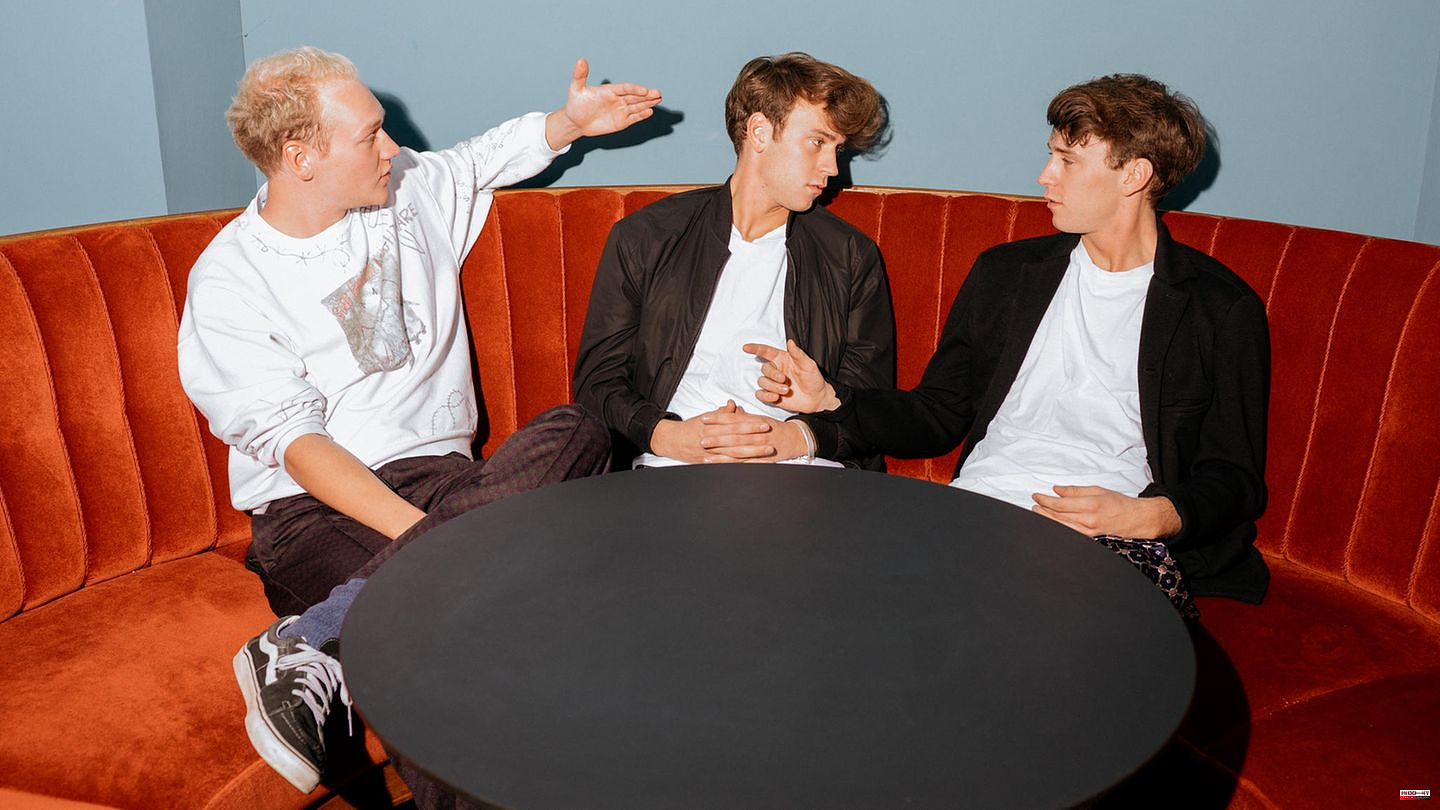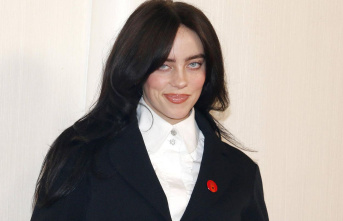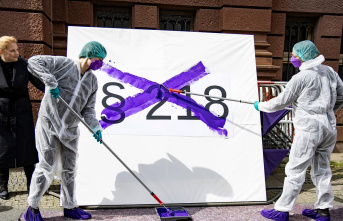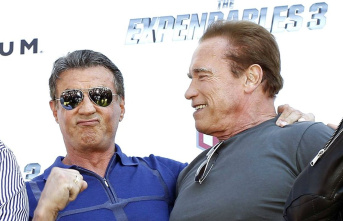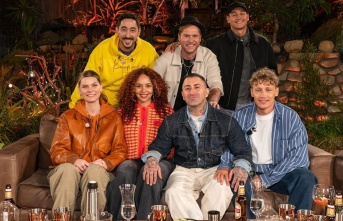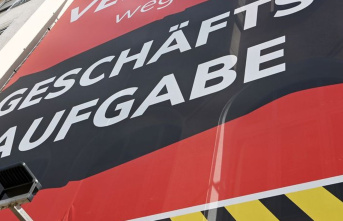The three directors of "Die Discounter" are in demand. In Munich, they have just received the "Blue Panther" audience award for their supermarket series. Communication with them is via a press agency, the meeting with the star works on a sunny Wednesday at 2 p.m. at the beginning of November. But the three of them haven't seen too much of the sun that day. They just got up, say Emil and Oskar Belton, and soothe their madmen with routine hand movements.
The three suggested a meeting place, a bistro in Hamburg-Rotherbaum, the district of their flat share. Here they are doing the nights through for a new project. Cutting at night is much better, they say. That feeling. No appointments. Nobody is annoying. Now a lot of people want something, from November 11th the second season of "Die Discounter" will run on Amazon Prime – by three directors who are 23.
Oskar Belton orders a sugar-free cola, Bruno Alexander camomile tea and a small apple spritzer, Emil Belton a large apple spritzer. They are there, they wake up and off we go.
How often were you approached in the supermarket last year?Bruno: I was only approached once at the checkout. Then the cashier said that they felt "die discounter" full. Of course that's awesome.
Oskar: Recently, a branch manager came up to us and said: hey, folks, huge fan, let's take a picture.
Emil: When the three of us are out and about, we are often spoken to. Because we are known as a trio.
Bruno: When partying, it's awesome. We went to the club with the whole "Discounter" cast after the conclusion of the second season. People didn't understand at all.
How does the second season of "Die Discounter" differ from the first?Bruno: It's all well-established. In the first season we were still looking for the recipe. The second is faster. She is denser. It's even more uncomfortable. And there are some stars again.
Emil: We have Mats Hummels and Caro Daur, among others.
Oskar: We have Milena Tscharntke and Paula Hartmann. We have Adam Bousdoukos.
After the first season, did any stars approach you because they really wanted to be in the cast? Emil: Oh yes, so many. Kollegah and Mats Hummels wrote to Bruno. And a lot of people wrote to the caster too. But at some point we had to say, no, sorry guys, this is not a place for cameo appearances.
Everything else is the same at Feinkost Kolinski in Altona? Emil: Yes. The cast will be the same as in the first season.
Before the first season you did an internship in a supermarket. As a director, should you have experienced what you are showing yourself?
Bruno: It is definitely our claim. We want to be authentic and specific. You only get that if you experience it yourself and ask people.
Emil: If an employee tells us, for example, that her boss sent her onto the dance floor, then we ask: What does that mean? Dance floor, this is the floor where you work. What are we looking for? Those little real things.
Oskar: We used to be in front of the camera a lot in crime novels and TV series. The counter-example to our approach is when, for example, 50-year-old screenwriters try to tell something about youth and don’t know anything about it. Then you realize that somehow it's not real. Then when you're 14 you sell crystal meth in the schoolyard. I've never seen crystal meth.
Bruno: We had to learn for ourselves that we tell the stories that we can really tell. And those are the interpersonal little moments. "Discounter" isn't really primarily a supermarket series. It's about the people who work in this supermarket. The supermarket is only a good choice because a wide variety of people have to get along with each other in a small space.
Authenticity is important to you. Is it really authentic that the boss is so stupid?Emil: A lot of people said that.
Bruno: So many.
Emil: We actually met bosses who were almost like Torsten.
Oskar: We heard things that we had to understate when telling stories because nobody would believe it.
Emil: We have heard from employees who no longer shop in supermarkets at all, but only in organic shops or small shops. What they do with their goods is disgusting.
Oskar: Once two people pissed in a cleaning machine and then the whole market was cleaned with it. It stank of urine for two weeks.
The series thrives on its dialogues. You only provide a basic framework, the rest is improvised. What makes a good dialogue?Emil: A ping-pong game. When both play together.
Oskar: You also have to be able to withdraw. The scene only gets good if you don't even think about the fact that you're in a scene. Everyone always says that improv is super awesome and super difficult, but impro is actually the much easier version of acting.
Emil: For some. Not at all for others.
Bruno: A good scene also counts if it doesn't necessarily want to promote something. Much at "Discounter" is extremely void.
How did it come about that three 22-year-olds shot an Amazon series?Oskar: Through "Intimate", a web series that we uploaded to YouTube. We've always told a lot of people to please tell Christian Ulmen that we're shooting the series. We used to annoy him a lot on Instagram. Whenever we knew someone who worked with Christian on their set, we sent them the link directly. And then at some point he bit and sent a voice message on Instagram. Then he was like: Hey, folks, I have a series on the table here. do you want to turn it?
Emil: Two months later we were already on the set. I think it was primarily just the same humor and the same way of telling the story.
Oskar: We don't tell classic jokes like in comedy shows, but try to find the joke in the interpersonal and in the shame.
The "Discounter" is very reminiscent of formats by Christian Ulmen and his sense of humor, for example in "Jerks". How many elms are in "Discounter" and how many are really from you?Oskar: We have the same sense of humor. But Christian and his colleague Carsten Kelber really let us do it, but gave a lot of important tips. We then wrote the screenplays entirely ourselves, and we did the editing entirely ourselves.
What got you excited about film so early on? Emil: We just tried everything. Music, all sports, any weird business ideas. Film and acting just worked best.
Oskar: We've always been big fans of building shit. Each of us sat in thousands of disciplinary conferences, one or the other even flew. With the film, you could do all of that without anyone forcing you to talk to your parents.
Bruno: We've always been looking for a medium to tell stories and to get rid of our thoughts. When we shot "Intimate" it was always super fast. We didn't talk big or write anything, we just held the camera on it. The hottest things are always created in the moment.
In recent years, many German YouTubers have tried their hand at making the leap to television or streaming services. Why did it work for you, which usually has a cringe effect on others?Oskar: We do the same shit as before with a bigger budget. Entertainers and classic YouTubers are primarily about self-expression. With us everything was always fictional. These formats that content creators are suddenly acting in are flopping because people don't want to see them that way.
Emil: We just try not to look cool in our formats and try to look as little as possible like a boy band. No one takes themselves too seriously and everyone takes hops from each other. That's why nobody at "Discounter" seems really cool. These are all rather lost souls.
Bruno: The funny thing is, both formats are cringe. We put ourselves in uncomfortable situations on purpose, others unintentionally.
When was the last time you were really embarrassed? Emil: We have embarrassing things happening to us all the time.
Oskar pulls out his mobile phone and looks something up.
Oskar: If something happens to me, then I write it down right away because it's all stuff for "Intimate" and "Discounter". Oh, here's something, but unfortunately I can't tell you that. That's too intense. You might see that in the next "Intimate" season.
Bruno: I recently paid for the train with a 50-euro note and accidentally said something like: That's right. And she's like, oh my god. Unfortunately I had to revise that. This makes me incredibly uncomfortable.
Oskar: I wanted to buy new pants. The cabins were too full, so I changed on the floor. I had just taken off my trousers and a bit of my underpants as well, when an employee came and said: You are not allowed to undress here in the area. When I think about it now, I blush because it was so embarrassing. That was so bad. And before that I thought I was flirting with her because I actually thought she was pretty. But that was not answered. I think she thought I was a pervert. That was the horror, Digga. I'm straight out too, then. Bought nothing.
You know each other from school. Twelve years later you founded your own production company "Kleine Brüder". Bruno: Emil, Leo Fuchs and I were in the same class, Oskar in the parallel class. Over the years we also got to know Max. Together we make "Little Brothers". When we had our Abitur in the bag, there was a brief standstill and we didn't know exactly what to do. Then came the idea of founding a production company that would appeal to young people.
At first we only thought about advertising, but then everything happened so quickly with Christian and Carsten. In the meantime, we no longer do any advertising with "Little Brothers", but only produce series.
And why this unusual name "Little Brothers"? We are all little siblings and always had this urge to rebel. We always wanted to be as advanced as our older siblings. This creates a certain restlessness.
How much do you separate friendship and business in difficult moments?Bruno: We used to always have the saying: we have to separate friendship and business. Now I think that doesn't make a lot of sense, because it's our great advantage that we've known each other for so long and like doing business together.
Oskar: Doing business together just sounds overly stupid. (laughs)
Bruno: Our big advantage is that we don't just get thrown in somewhere and have to prove ourselves. That simply makes many situations easier. When writing, you can easily get lost, then the others have to catch you and say: That sucks. Otherwise a script will quickly cringe.
So you don't feel like the third wheel among twins?Bruno: No, I've never really felt like that.
Oskar:Bruno is also more of a third twin than a friend. Emil checks me just as well as Bruno checks me.
After "Discounter" now "Intimate" again: What can we expect from your new series? Emil: We have completely remade "Intimate" for ProSieben
But it's the same five guys, so Oskar, Bruno, Max, our producer, Leo and me. It's also still about embarrassing moments from our everyday life and the same topics as in our youth. The biggest difference is that it has become much more diverse. The female roles are much stronger. Back then, female roles were often just dates.
Bruno: We learned a lot. For example, we are much more aware of the fact that we are five white, privileged boys from Eimsbüttel. We let that feel to us too.
Why did you take the old episodes from YouTube?Oskar: Because we found them way too sexist. It was just classic youthful dick humor.
Bruno: I would be uncomfortable if people googled "Intimate" and thought they were expecting the series right now. A lot of it was just bad and trashy too. Maybe we'll upload the old episodes again sometime out of nostalgia. Then "Intimate" hopefully stands for something else.

